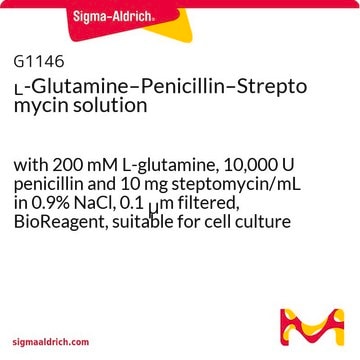11074440001
Roche
Penicillin-Streptomycin
suitable for cell culture, lyophilized (clear, colorless solution after reconstitution), non-sterile; 0.2 μm filtered, sufficient for 20 mL
Sinónimos:
antibiotic
About This Item
Productos recomendados
sterility
non-sterile; 0.2 μm filtered
Quality Level
form
lyophilized (clear, colorless solution after reconstitution)
usage
sufficient for 20 mL
manufacturer/tradename
Roche
concentration
50 mg/mL streptomycin in 0.9% NaCl (as sulfate)
50,000 U/mL penicillin in 0.9% NaCl
technique(s)
cell culture | mammalian: suitable
antibiotic activity spectrum
Gram-negative bacteria
Gram-positive bacteria
mode of action
cell wall synthesis | interferes
protein synthesis | interferes
storage temp.
2-8°C
General description
Sensitive organisms:
- Gram-positive bacteria (penicillin)
- Gram-negative bacteria (streptomycin)
- Stability:Penicillin: 3 days
- Streptomycin: 3 days in media at +37 °C
Application
Physical form
Preparation Note
100 μg/ml streptomycin
Reconstitution
Other Notes
signalword
Danger
hcodes
Hazard Classifications
Acute Tox. 4 Oral - Repr. 2 - Resp. Sens. 1 - Skin Sens. 1
Storage Class
11 - Combustible Solids
wgk_germany
WGK 3
flash_point_f
does not flash
flash_point_c
does not flash
Certificados de análisis (COA)
Busque Certificados de análisis (COA) introduciendo el número de lote del producto. Los números de lote se encuentran en la etiqueta del producto después de las palabras «Lot» o «Batch»
¿Ya tiene este producto?
Encuentre la documentación para los productos que ha comprado recientemente en la Biblioteca de documentos.
Los clientes también vieron
Nuestro equipo de científicos tiene experiencia en todas las áreas de investigación: Ciencias de la vida, Ciencia de los materiales, Síntesis química, Cromatografía, Analítica y muchas otras.
Póngase en contacto con el Servicio técnico









